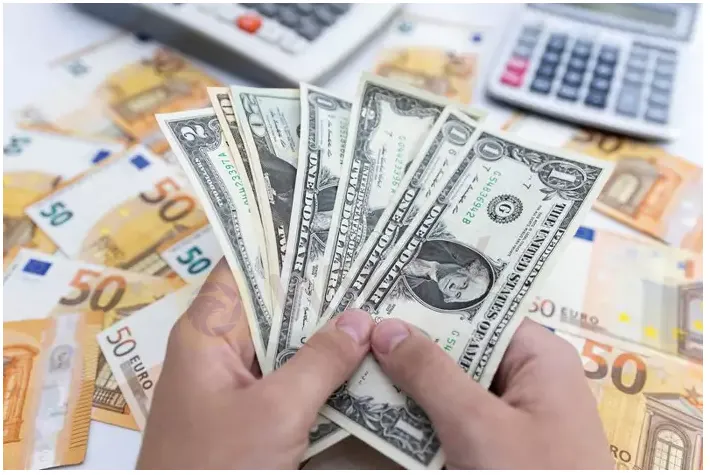简体中文
繁體中文
English
Pусский
日本語
ภาษาไทย
Tiếng Việt
Bahasa Indonesia
Español
हिन्दी
Filippiiniläinen
Français
Deutsch
Português
Türkçe
한국어
العربية
Euro under pressure as inflation fears send investors to dollar haven
Abstract: The euro struggled to regain a footing on Thursday, having tumbled overnight against a resurgent U.S. dollar, which benefited from safe-haven demand on renewed worries about higher rates and a global recession.

SINGAPORE/HONG KONG (Reuters) – The euro struggled to regain a footing on Thursday, having tumbled overnight against a resurgent U.S. dollar, which benefited from safe-haven demand on renewed worries about higher rates and a global recession.
The euro was at $1.044, after losing 0.75% on the dollar the day before, and heading for a monthly decline of 2.7%.
It also dropped to a fresh 7-1/2-year low versus the Swiss franc at 0.99663 francs, with the Alpine currency another beneficiary of safe-haven flows and also still basking in the afterglow of the Swiss National Banks surprise rate hike two weeks ago.
Christopher Wong, senior FX strategist at Maybank, attributed the euros fall against the dollar to the market moving away from riskier assets after “central bankers warned of lasting inflation and that they would prioritise combating (it), resulting in broad dollar rebound overnight.”
A steady and aggressive global switch to tighter policy has stoked recession worries and shaken financial markets in recent months.
Speaking at the European Central Banks annual conference in Sintra, Portugal, U.S. Federal Reserve Chair Jerome Powell said it was important to bring down inflation, even if it meant economic pain, with similar remarks from ECB President Christine Lagarde.
Lower German inflation figures also briefly weighed on the euro, said Ray Attrill head of FX strategy at National Australia Bank, before “the market realised that there was some special factors there, it wasnt a genuine downside surprise.”
“The bigger picture worry is what happens with energy supplies in the eurozone as we head towards the winter… Were quite cautious about the euro,” Attrill added.
The dollar was also on the front foot against other majors, with sterling hunkered down at $1.21225, with losses this week leaving it set for a 3.8% monthly decline, while the Australian dollar was struggling at $0.6873.
The dollar also hit fresh a 24-year peak of 137 yen overnight, as the gap between a hawkish Fed and a dovish Bank of Japan continues to weigh heavily on the yen, which was last trading at 136.57 yen.
The BOJ is able to keep interest rates pinned down because Japanese inflation is still low by global standards, though even small price rises are causing a messaging problem for the central bank.
The dollar index, which measures the greenback against six peers, was at 105.19, a two week high.
Bitcoin, dipped back below the symbolic $20,000 level on persistent market ructions, and was also hurt by the U.S. Securities and Exchange rejecting a proposal to list a spot bitcoin exchange-traded fund by Grayscale, one of the worlds biggest digital asset managers.

Disclaimer:
The views in this article only represent the author's personal views, and do not constitute investment advice on this platform. This platform does not guarantee the accuracy, completeness and timeliness of the information in the article, and will not be liable for any loss caused by the use of or reliance on the information in the article.
Read more

The Daily Habits of a Profitable Trader
Every professional trader follows a structured approach to ensure they are well-prepared, disciplined, and able to seize opportunities with confidence. Whether you are a seasoned investor or an aspiring trader, adhering to a robust daily checklist can significantly enhance your performance. Use this checklist to check if you are a qualified trader

The Impact of Interest Rate Decisions on the Forex Market
Interest rate changes determine currency attractiveness, influencing capital flows and exchange rate trends. Understanding this mechanism helps investors navigate the forex market effectively.

How a Housewife Lost RM288,235 in a Facebook Investment Scam
A 47-year-old housewife in Malaysia recently fell victim to an online investment scam, losing a substantial sum of RM288,235 after engaging with a fraudulent scheme advertised on Facebook.

A Trader’s Worst Mistake: Overlooking Broker Reviews Could Cost You Everything
In today’s digital age, reviews influence nearly every decision we make. When purchasing a smartphone, television, or home appliance, we pore over customer feedback and expert opinions to ensure we’re making the right choice. So why is it that, when it comes to choosing an online broker where real money and financial security are at stake many traders neglect the crucial step of reading reviews?
WikiFX Broker
Latest News
The Withdrawal Trap: How Scam Brokers Lure Victims into Paying More
FCA to Investors: Think Twice Before Trusting These Brokers
Trump\s tariffs: How could they affect the UK and your money
Trump gambles it all on global tariffs he\s wanted for decades
TradingView Brings Live Market Charts to Telegram Users with New Mini App
Trump tariffs: How will India navigate a world on the brink of a trade war?
Interactive Brokers Launches Forecast Contracts in Canada for Market Predictions
Authorities Alert: MAS Impersonation Scam Hits Singapore
Stocks fall again as Trump tariff jitters continue
IG Group Acquires Freetrade for £160M to Expand UK Investment Market
Currency Calculator







